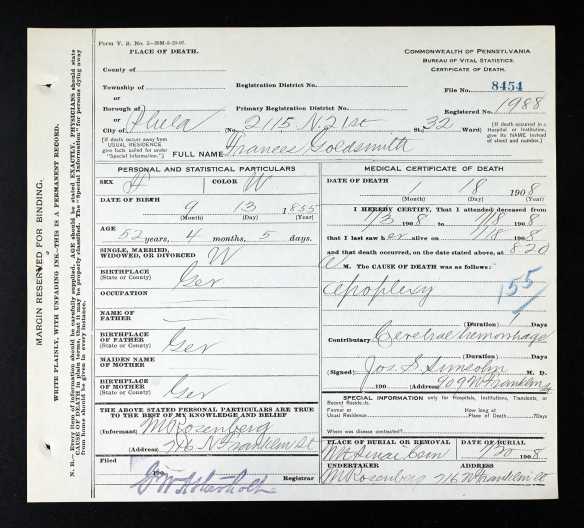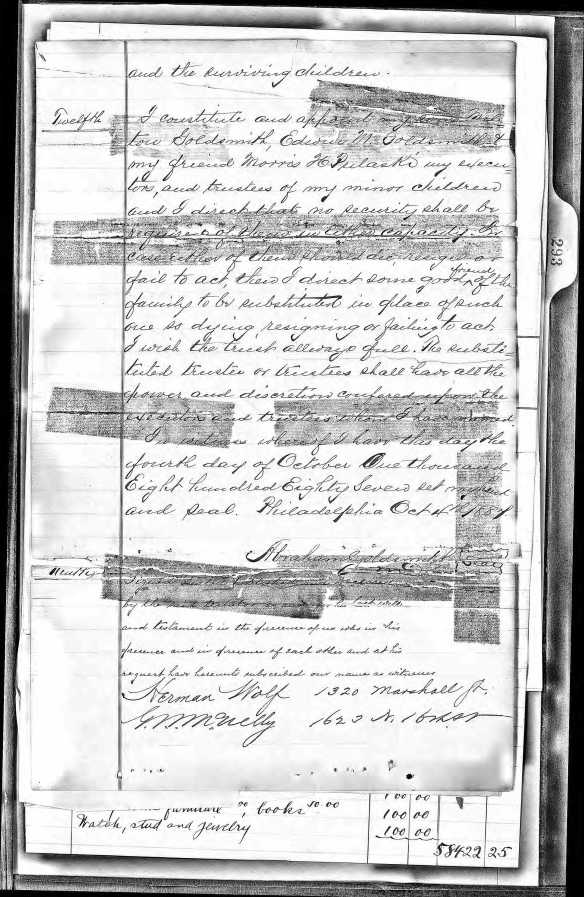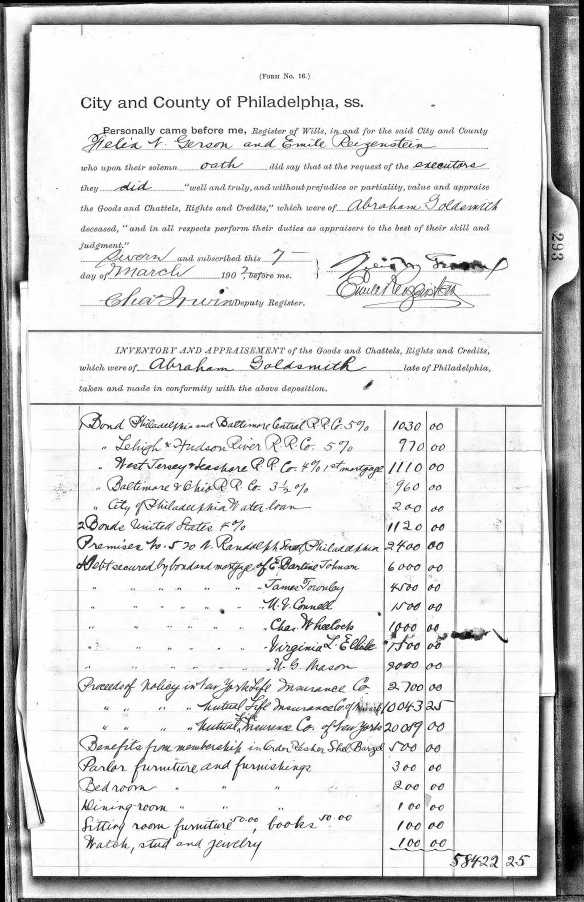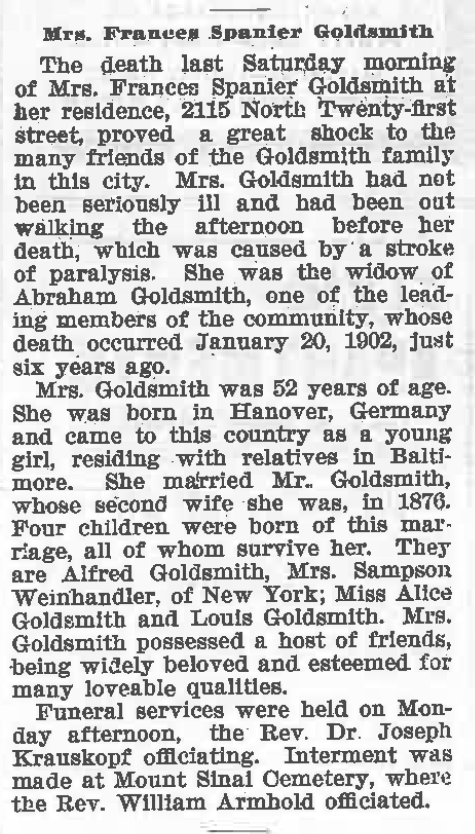As the 20th century began, the family of Abraham Goldsmith was doing quite well. His first four children with his first wife Cecelia were all married and living in Philadelphia; three of them had had children, giving Abraham seven grandchildren. His five younger children were still living at home with him and his second wife Frances and ranged in age from seventeen to thirty. All but Louis, the youngest, were employed outside the home. On February 1, 1901, Abraham was blessed with an eighth grandchild when his son Milton and his wife Sophie had their first child, a daughter they named Rosalind.1
Abraham, however, had been in poor health ever since suffering a stroke in about 1890, and he died on January 20, 1902, from “chronic softening of the brain.” From what I can gather from various internet sources, the condition is also known as encephalomalacia, and the softening of brain tissue is usually caused by a stroke, hemorrhage, infection, or injury. Abraham was 69 when he died. He left behind his wife Frances, his nine children, and eight grandchildren.

Abraham Goldsmith death certificate
“Pennsylvania, Philadelphia City Death Certificates, 1803-1915,” database with images, FamilySearch (https://familysearch.org/ark:/61903/3:1:S3HY-6737-JK6?cc=1320976&wc=9FRP-DP8%3A1073221502 : 16 May 2014), 004009534 > image 785 of 1754; Philadelphia City Archives and Historical Society of Pennsylvania, Philadelphia.
In the obituary in the Philadelphia Jewish Exponent,2 Abraham’s business was described as “one of the most prominent in its line in the United States.” He served on the boards of several financial institutions and was a member of two lodges. Abraham was not only an important business owner in Philadelphia, he was a leader and “rendered conspicuous service” in several charitable organization including being “president of the Orphans’ Guardians, a trustee of Keneseth Israel Congregation, director and vice president of the Jewish Hospital Association, and secretary of the United Hebrew Charities.”
Abraham’s funeral was “largely attended;” the rabbi “paid high tribute to [his] many virtues, his philanthropic instincts and sterling character, referring feelingly to the many acts of kindness and generosity which had endeared him to those whom he had aided during his lifetime, and to his tireless activity in all good work.”
The Philadelphia Times also published an obituary, describing Abraham as “one of the pioneer Israelites in this city” and listing his various charitable activities.3 The Philadelphia Inquirer described him as a “prominent business man of this city.”4
I found Abraham’s will quite interesting and transcribe it here in its entirety from the handwritten text:5
I Abraham Goldsmith of Philadelphia merchant do make publish and declare this to be my last will and testament, revoking all former wills ever made.
First: I give and bequeath to my son Milton my library and bookcase and the oil painting of his mother Cecelia Goldsmith.
Second: I give and bequeath to my son Edwin M my gold watch chain, masonic mark and my diamond stud.
Third: All other jewelry, coins, laces, and trinkets of my first wife shall be divided between my daughters Rose, Emily and Estelle as keepsakes by my executors in such manner as they shall think proper.
Fourth: Subject to the above provisions I give bequeath and devise to my executors and trustees all my estate real residual and ? for the purposes and upon the trusts here in [end of page 1] after expenses.

Pennsylvania probate record; Probate Place: Philadelphia, Pennsylvania
Source Information
Ancestry.com. Pennsylvania, Wills and Probate Records, 1683-1993 [database on-line]. Provo, UT, USA: Ancestry.com Operations, Inc., 2015.
Original data: Pennsylvania County, District and Probate Courts. Wills, No 277-299, 1902
Sixth: As much or all of my Real estate as my heirs and executors deem best to be disposed of at public and private sale as soon as convenient after my death and the executors to make good title without being compelled to give security for the proper application of the funds to be received and the money so received to be considered as invested in personal property prior to the sale.
Seventh: My property to be so divided that my wife shall receive her share absolutely and the ballance [sic] to be divided among my children share and share alike so that my children of age shall receive their share at once and those that are minors to receive their share on becoming of age.
Eight: That my wife shall be guardian [end of page 2] for the minor children during their minority, she receiving the income derived from the investments for their support and education until of age and no longer.
Ninth: That the executors and trustees for the minor children have full power to invest and call in and reinvest at their pleasure and at their discretion, the investments not to be confined to what are termed legal investments.
Tenth: That my Life Insurance which was held in trust, and endowments which may be coming to me from different Societies and Lodges, shall be considered as part of my personal property and to be distributed as per direction of my Will.
Eleventh: In case of death of anyone of anyone [sic] of my children during its minority or as long as they are unmarried, all expenses incurred during sickness and burial expenses shall first be paid out of the portion set aside for the minor child and the ballance [sic] remaining to be divided in equal parts between my wife [end of page 3] and the surviving children.
Twelfth: I constitute and appoint my sons Milton Goldsmith, Edwin M Goldsmith, and my friend Morris H. Pulaski my executors, and trustees of my minor children and I direct that no security shall be required of them in either capacity. In case either of them should die, resign or fail to act, then I direct some good friend of the family to be substituted in place of one so dying, resigning or failing to act. I wish the trust always full. The substituted trustee or trustees shall have all the power and discretion conferred [sic] upon the executors and trustees who I have named.
In witness whereof I have this day the fourth day of October One Thousand Eight hundred Eighty Seven set my hand and seal. Philadelphia Oct 4th 1884.
Abraham Goldsmith [witnessed and sealed]
To add some context to these bequests, here is the estate inventory filed with the will:
Note that the largest elements in his estate were the proceeds of his life insurance policies, one being over $10,000, another over $20,000, and that the personal items were worth far less. For example, the books left to Milton were worth $50, the watch, stud, and jewelry totaled $100. To put this in today’s dollars, I turned once again to an inflation calculator. One hundred dollars in 1902 would be worth over $27,000 today; $20,000 would be worth over $558,000. Abraham’s estate’s total value, $58,422.25, would be equivalent to $1,631,049.62 in today’s dollars.
Abraham had claimed to have $45,000 in personal and real property on the 1880 US census. He then suffered a serious financial setback in 1886 after his brother Levy died. But at the time of his death, Abraham’s estate was worth over $58,000, or more than $1.6 million dollars in today’s money. Pretty impressive for a man who came to America as an immigrant when he was just eighteen.
Based on those numbers and the inflation calculator, it appears that Abraham had a library worth about $13,500, which he left to his son Milton. That tells me something about both Abraham and Milton—two men who must have greatly valued books. In fact, as we will see, Milton and his brother Louis both had careers that involved books. I also loved that Abraham made sure that those things that had belonged to his first wife, Cecelia, went to her children, including an oil painting of Cecelia. How I wish I knew what had happened to that painting. Maybe one of Milton’s descendants still has it? I hope so.
Abraham wrote the will before he went through the financial crisis in his business in 1886 and before he suffered the debilitating stroke in about 1890. When Abraham wrote this will in 1884, his five youngest children were still quite young—less than ten years old—whereas Milton and Edwin, whom he named as his executors, were 23 and 20, respectively. When Abraham died in 1902, Louis, his youngest child, was twenty—the same age Edwin had been when Abraham originally wrote the will and named Edwin as an executor. It’s interesting that Abraham never changed his will to reflect the changes in his financial situation, his physical condition, or the changing ages and circumstances of his children, including their marriages and their children. There is no provision for grandchildren in the will.
Sadly, six years after Abraham died, his second wife Frances Spanier Goldsmith died. She was only 52 years old and died after suffering a stroke (apoplexy). Her obituary in the Philadelphia Jewish Exponent reported that her death “proved a great shock to the many friends of the Goldsmith family in this city. Mrs. Goldsmith had not been seriously ill and had been out walking the day before her death, which was caused by a stroke of paralysis.” Abraham also had suffered a stroke, and his first wife Cecelia had died from a stroke when only 35. What was it about their lives that made them all susceptible to strokes?

Frances Spanier Goldsmith death certificate
Pennsylvania Historic and Museum Commission; Pennsylvania, USA; Certificate Number Range: 006001-010000
Ancestry.com. Pennsylvania, Death Certificates, 1906-1966
Frances’ obituary further commented that “Mrs. Goldsmith possessed a host of friends, being widely beloved and esteemed for many loveable qualities.”
The Philadelphia community lost two well-regarded citizens with the deaths of Abraham and Frances (Spanier) Goldsmith, and their children lost beloved parents. But those children, by then all adults, lived interesting lives. The posts to follow will focus on Abraham’s nine surviving children and their lives in the 20th century.
- Pennsylvania, Philadelphia City Births, 1860-1906,” database with images, FamilySearch(https://familysearch.org/ark:/61903/1:1:VBYW-R9L : 9 March 2018), Rosalind Goldsmith, 01 Feb 1901; citing bk 1901 p 107, Department of Records; FHL microfilm 1,289,340. ↩
- Abraham Goldsmith obituary, The Philadelphia Exponent, January 24, 1902, p. 3. ↩
- The Philadelphia Times, January 22, 1902, p. 7. ↩
- “Abraham Goldsmith Dead,” The Philadelphia Inquirer, January 22, 1902, p. 6. ↩
- Pennsylvania probate record; Probate Place: Philadelphia, Pennsylvania. Source Information: Ancestry.com. Pennsylvania, Wills and Probate Records, 1683-1993. Wills, No 277-299, 1902. ↩







I always love seeing details of the personal things left to others in wills. In one will I remember seeing from a fairly wealthy man who died in London, it mentioned things like silhouette portraits. It really does make you wonder what became of them.
I saw recently on one of Paul’s great great grandparents wills it mentioned a piano. It was so nice knowing that the family had one. Wills are a fantastic resource.
LikeLiked by 1 person
I have not had much luck finding many of them since most of my ancestors probably had too few assets to bother with a will, but more and more I am finding links to them on Ancestry. I need to pay more attention!
LikeLiked by 1 person
That is sad about the strokes. So Abraham was 57 when he had his stroke? And both wives died from strokes. And Cecilia SO young, but really all 3 of them very young to have strokes. What lifestyle factors enter into a stroke? No matter how you look at it, it’s a cluster that must be coincidental, don’t you think? Like you, my mind immediately sailed away with that painting of Cecilia! Wouldn’t THAT be a coup to track that down haha?! For all you know it’s in a museum somewhere–have you checked with the museums in Philadelphia for “backstock”? I mean the pieces that are not out on show. How did you find the will? Can you share the process you went through to find it?
LikeLiked by 1 person
I was just really lucky—it is on Ancestry. Pennsylvania is remarkably good about putting things online (unlike New Jersey). When I found his death certificate, there was a direct link on Ancestry to his will. Other times there is just a link to an index, but I assume you can then write away for the actual document.
I always associate strokes with being overweight, smoking, having high blood pressure, or some kind of clot going to the brain. But I am not an MD! Maybe they all ate bad food, smoked, and lived with too much stress.
LikeLiked by 1 person
I’m pretty sure life was stressful. And maybe they could afford more fats and sweets than people who were less well off, too. Did the women smoke, do you think?
LikeLiked by 1 person
This is an interesting article—it seems smoking cigarettes was not common at all in the US until the 1880s and that women were discouraged from smoking, though immigrants and poor women were more likely to smoke. But by the 1890s and certainly the early 20th century, women were smoking cigarettes. (The article doesn’t address cigars or pipes.) http://tobacco.harpweek.com/hubpages/CommentaryPage.asp?Commentary=Women
LikeLiked by 1 person
I imagine a lot of our male ancestors smoked cigars and pipes. I’ve even seen them in some of my photos. Thanks for the article! (I’m thinking that some immigrants and poor women had jobs that were stressful and sometimes even stinky so cigarette smoke might even smell better than the workplace!
LikeLiked by 1 person
The article seems to suggest that it was much more common for women to smoke in Europe and other parts of the world, so that seems to explain why immigrants smoked.
LikeLiked by 1 person
Yes, it does say that. I wonder if there are any studies on the statistics of socio-economic class and smoking. Then, but now too. But today smoking is so expensive. Now I wonder if it was expensive then. You know me: the question machine.
LikeLiked by 1 person
LOL! I wish I had the answers to all your great questions!
LikeLiked by 1 person
That’s kind of a depressing article, in some ways! It also reminded me that Sara Howard in The Alienist (if you are watching, please don’t give away the ending as it’s DVRed and ready to be watched over here ;)) smokes cigarettes. The year is supposed to be 1896.
LikeLiked by 1 person
No worries—I don’t even know what The Alienist is! Should I?
LikeLiked by 1 person
LOL! Did you ever hear of that book or books by Caleb Carr? The Alienist, about a psychologist who helped solve murders. It appeals to the Jack the Ripper crowd.
LikeLike
Nope. I am not much of a mystery or crime reader so not surprised that I haven’t heard of him.
LikeLiked by 1 person
It’s on TNT.
LikeLiked by 1 person
I marvel at the clear and precise language in Abraham Goldsmith’s will, which left little room for any deviant interpretation and cause for a family feud later down the road. Abraham died a wealthy man who knew how manage his assets extremely well setting an example for any modern day entrepreneur.
LikeLiked by 1 person
I do wonder whether he would have made any changes as time went on and his younger children became adults. It makes me think that perhaps the stroke left him somewhat incapacitated and unable to make those changes. But it seems his family was well taken care of so perhaps there was no reason to make any changes. Thanks for your thoughts, Peter!
LikeLike
I love that Abraham was described as a leader and “rendered conspicuous service” in several organizations. It also sounds like he was very savvy in the financial department and that it served him very well. His will was quite specific and when I read about the oil painting, my first thought was, “Where is it now?” This gives you an impression of what his home was like, books, paintings, special jewelry he wanted passed to his daughters. The images the will evokes made me smile; he was a very thoughtful man. Is there a way to find out about that painting?
LikeLiked by 1 person
I agree—I loved the idea that he had a library and that he had a son who would value inheriting the library. Next we will learn more about that son, Milton. And I will see if I can find any tips for finding the painting! Thanks, Karen.
LikeLike
I am with Peter Klopp on the precise language of the will. I too would love to know what happened to the oil painting of Celcelia Goldsmith. Are you in any contact or know of any Goldsmith descendants? I can’t remember. Makes me think of the portraits we see in antique stores. I always want to know their stories, how and why the ended up on some wall looking for a home. I certainly hope that didn’t happen to Celcelia. Great post Amy!
LikeLiked by 1 person
Thanks, Sharon. I have tried contacting a few of the Goldsmith descendants, but so far no responses. I searched online for a portrait of Cecelia using Google, but no luck. I am hoping that Milton’s descendants have the portrait or know where it is, but as I said, I’ve gotten no response to my attempt to make a connection. 😦
LikeLiked by 1 person
I hope you hear something at some point. Just yesterday I received a reply from an inquiry made months ago and thought I would never get a response. In fact I had forgotten all about the contact. Fingers crossed for you
LikeLiked by 1 person
Thanks, Sharon. I will keep hoping.
LikeLiked by 1 person
Would so love to have seen that painting. There are two oil portraits (of my great-grandfather and of my mother herself) in my mother’s house that I admit to coveting.
LikeLiked by 1 person
I am still hoping that Milton’s descendant will get in touch and know what happened to the portrait….maybe she has it!
LikeLiked by 1 person
It sure does make you wonder what caused a stroke in all three of them at such a young age. I love the obituary WITH A PICTURE!
LikeLiked by 1 person
Yes, I am always so excited to find a picture of what any of my relatives looked like!
LikeLike
One of the extra bonuses from the newspaper research is the photo of Abraham in the obit. That’s not something I commonly see and I’m glad you got this!
LikeLiked by 1 person
Thank you, Emily! I always love seeing the faces of my long-lost relatives!!
LikeLiked by 1 person
Sometimes photos turn up in old passport files, too. Also Declarations of Intent. I got a good feeling about Abraham from this posting.
LikeLiked by 1 person
Me, too. He will be one of the relatives I think of tonight at Passover. Like so many, he made the trip from oppression to freedom.
LikeLiked by 2 people
I am happy you have made this connection spiritually to Abraham. I was very touched by the care he took in making sure his precious personal items were properly distributed among his children.
LikeLiked by 2 people
As was I. I love that he wanted the children of his first wife to have her personal belongings. It showed how much he had loved her and how much his children had loved her so many years after her premature death at age 35.
LikeLiked by 1 person
PS: Blessed Passover.
LikeLiked by 2 people
Thank you,
LikeLiked by 1 person
Pingback: Bertha, Alice and Louis: Eluding the Census | Brotmanblog: A Family Journey
Pingback: Milton Goldsmith’s Family Album, Part II: Loving Tributes to His Grandfather and Father | Brotmanblog: A Family Journey